Subjects and Topics: Copyright, Legal Issues, Culture, Free Speech, and Privacy.
INSERT
Internet access is not equal across the US. The type and quality of Internet access varies significantly by location. Some US states enjoy what’s among the fastest and most reliable Internet in the world. However, that’s far from the norm. Over 24 million Americans still don’t have broadband Internet at home.
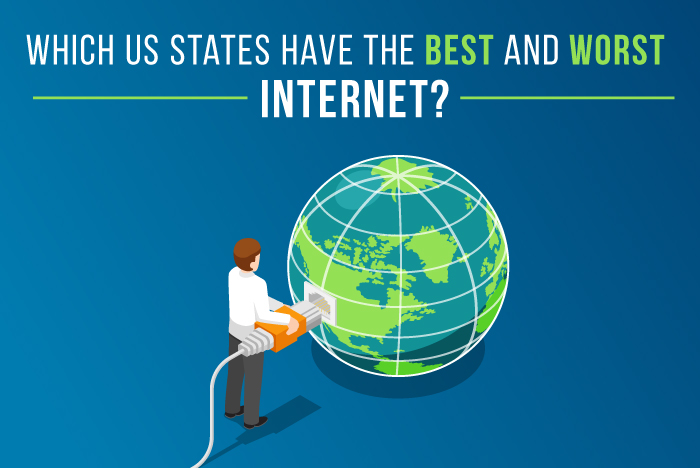
What states deliver the best Internet experience? What states deliver the worst? Researchers recently took a sweeping look at broadband availability across the entire country. Here’s what they found:
In this article you will find out... [show]
A Big Picture Look at US Broadband
The average Internet speed across all 50 states is 35.36 Mbps. Speeds in every state fell within 17 Mbps (either higher or lower) of that average.
New Jersey has the nation’s best Internet. Broadband covers 99% of the Garden State with an average speed of 52 Mbps.
The top five states with the best Internet are the following:
- #1 New Jersey – 52.0 Mbps Average Speed – 99% Coverage
- #2 Connecticut 41.8 Mbps 99%
- #3 Rhode Island 46.7 Mbps 98.2%
- #4 New York 46.7 Mbps 97.6%
- #5 Massachusetts 43.5 Mbps 97.6%
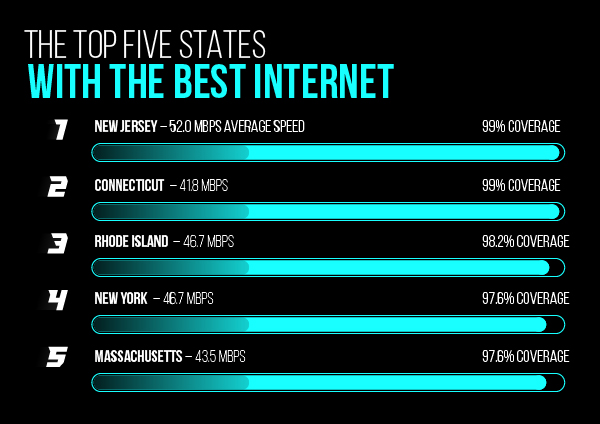
Montana’s Internet is the worst. The state’s average speed is a low 20.3 Mbps with a coverage area of only 69.2%.
The five states with the worst Internet are the following:
- #46 Wyoming – 29.9 Mbps average speed – 75.2% Coverage
- #47 Oklahoma 26.8 Mbps 74.5%
- #48 Arkansas 25.0 Mbps 73.3%
- #49 Mississippi 25.2% Mbps 70.2%
- #50 Montana 20.3 Mbps 69.2%
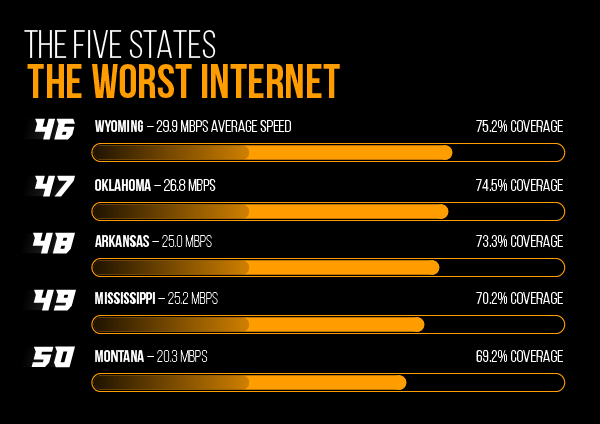
Here’s a closer look at the remaining states:
- #6 Delaware – 44.9 Mbps average speed – 97.5% Coverage
- #7 Hawaii 22.5 Mbps 96%
- #8 Maryland 51.3 Mbps 96.7%
- #9 California 29.0 Mbps 94.5%
- #10 Florida 41.2 Mbps 94.9%
- #11 Utah 37.2 Mbps 94.9%
- #12 Pennsylvania 41.4 Mbps 94.7%
- #13 New Hampshire 37.4 Mbps 94.3%
- #14 Washington 41.0 Mbps 94.2%
- #15 North Carolina 42.4 Mbps 93.1%
- #16 Ohio 32.1 Mbps 91.9%
- #17 Illinois 40.4 Mbps 92.3%
- #18 North Dakota 28.6 Mbps 92.2%
- #19 Nevada 34.3 Mbps 91.8%
- #20 Georgia 39.1 Mbps 90.6%
- #21 Maine 21.2 Mbps 89.7%
- #22 Virginia 48.7 Mbps 89.9%
- #23 Colorado 40.9 Mbps 90.4%
- #24 Tennessee 36.6 Mbps 89.9%
- #25 Oregon 39.1 Mbps 89.7%
- #26 Michigan 28.7 Mbps 88.3%
- #27 Minnesota 36.8 Mbps 88.1%
- #28 South Carolina 39.3 Mbps 88.2%
- #29 Arizona 33.9 Mbps 86.7%
- #30 Texas 46.9 Mbps 86.9%
- #31 Vermont 22.4 Mbps 86.1%
- #32 Wisconsin 37.5 Mbps 85.3%
- #33 South Dakota 26.8 Mbps 85.3%
- #34 Indiana 36.7 Mbps 85.7%
- #35 Kentucky 30.5 Mbps 85.3%
- #36 Louisiana 35.1 Mbps 84.6%
- #37 Idaho 25.6 Mbps 82%
- #38 Iowa 24.7 Mbps 83.7%
- #39 Nebraska 27.1 Mbps 82.4%
- #40 Kansas 39.9 Mbps 81.9%
- #41 Alabama 33.7 Mbps 81.2%
- #42 Missouri 38.5 Mbps 80.1%
- #43 New Mexico 30.0 Mbps 80.3%
- #44 Alaska 27.9 Mbps 78.2%
- #45 West Virginia 29.9 Mbps 75.2%
General Trends in Internet Speed by State
State rankings make for fun bragging rights if you happen to live somewhere with great Internet. The info can also be useful if you’re looking to move either within your state or to a new one.
However, the major purpose of state rankings is to identify national trends. After studying the numbers, one major trend is clear:
Large, rural states have less Internet coverage and slower speeds than small, highly-populated states.
Montana’s population density is seven people per square mile, while New Jersey has a whopping 1,195 people per square mile.
The Garden State has the highest population density in the US. Plus, it’s relatively small. Covering the entire state with broadband isn’t complicated because it’s basically one large urban area.
However, Montana isn’t the least populated state. It’s ranked 45 out of the 56 states and territories. Why is this important? It shows us that population density plays an important role in broadband access within a state, but it’s not the only factor.
State wealth also plays a role. California is the fourth wealthiest state with the ninth fastest Internet. Washington is the wealthiest with an Internet-speed ranking of 14.
Wealthy states tend to have average-to-high levels of coverage. However, folks living in poor cities are ten times less likely to have broadband Internet at home.
Developing broadband in large, wealthy areas with a high population density will always be the safest investment for Internet providers. That’s true for both large companies like Cox and Xfinity as well as smaller providers such as Google Fiber.
Calculating Broadband Speed by State
Internet marketing agency Akamai recently released a comprehensive State of the Internet Report. They measured average Internet speed in all 50 states plus Washington, DC, and five US territories. Additional research is provided by telecommunications company Windstream Enterprise.
Calculating broadband speeds can be complicated. First, researchers look at data from FCC Form 477, which is a biannual report detailing government records related to broadband coverage. The data in the records is accurate but often incomplete.
Next, researchers compare the FCC data with information from ISPs. Combining information from both sources helps create a complete picture of broadband coverage.
What is Broadband Internet?
Often referred to as high-speed Internet, “broadband Internet” is defined by the FCC as service with minimum speeds of 25 Mbps download and three Mbps upload.
However, they also recognize slower speeds are still effective. They recommend a download speed of at least five Mbps for streaming HD video and four Mbps for online gaming. Additional information is available on the FCC website.
Broadband Internet refers to any high-speed, always-on Internet connection. There are four delivery methods:
- Cable
- DSL
- Fiber optic
- Wireless
Calculating Average Speeds
Researchers collected speed primarily using M-Labs. It’s an open-source speed testing tool run by Google, Princeton University, and others. Researchers also relied on a few other speed test tools to help confirm results.
They divided the speed test results into three categories:
- Service provider
- State
- City
Keep in mind the study looked at the average speed across the entire state. You might live in a state known for slow Internet but personally get blazing fast speeds at home.
Generally, state governments focus on total coverage areas and average Internet speeds. Those two metrics help assess the state’s overall Internet health.
A Look at Internet Speed by City
Individuals should focus on city speeds. For example, Missouri ranks #42 on the list, making their Internet speeds among the country’s slowest. Yet Kansas City is also the home of Google Fiber. If you live in KC, you have access to top Internet speeds. However, those living in rural Missouri often can’t even get broadband, much less FiOS.
If you’re moving to a new location, and want to live somewhere with fast Internet, focus on the speeds available in the cities instead of the state overall.
Here’s a closer look at the top 10 cities with the fastest Internet speeds in the US:
- Harbor City, CA 818.95 Mbps
- Hoschton, GA 804.98
- Wenham, MA 781.77
- Pagosa Springs, CO 741.45
- Maspeth, NY 724.12
- Asbury, NJ 717.95
- Bala Cynwyd PA 711.53
- Gurley AL 685.85
- Schertz TX 657.66
- Baldwin NY 630.40
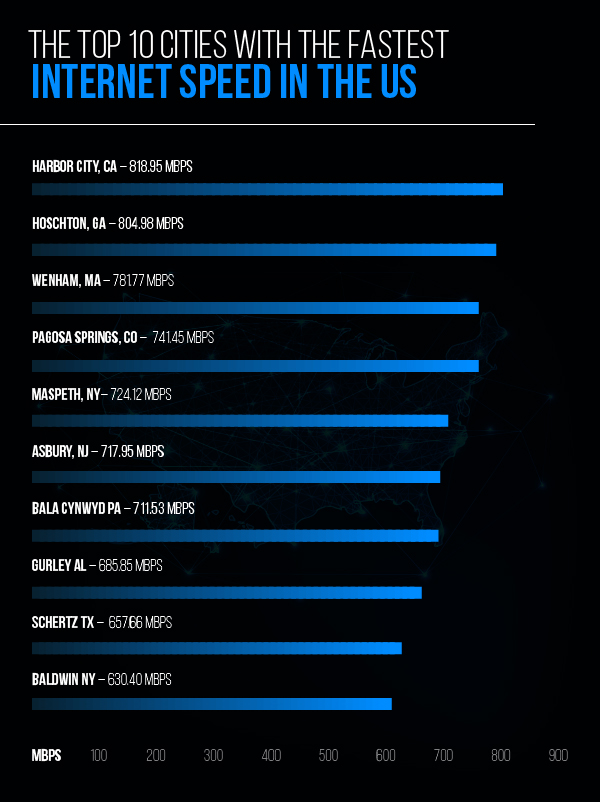
Potential Issues When Assessing a State’s Internet Speed
Two factors often alter the data gathered:
Faulty Tests
If your home Internet isn’t performing as fast as it should, running a speed test is usually one of the first diagnostic steps taken.
Users experiencing faulty routers, modems, or other technical issues conduct far more speed tests than users who are happy with their Internet speeds. So, speed tests often reflect results worse than what you’ll likely experience as long as your equipment remains in proper working condition.
Economy Plans
Most people don’t choose the fastest plans available from their ISP. After all, packages with fast speeds have the highest costs. So-called economy plans are the most popular option across all 50 states. People want to stream and play online games without issues, but they typically don’t want to pay more for top-of-the-line speeds.
City and state speed averages typically skew on the slow side because most users don’t subscribe to the fastest plan possible.
How Do US Internet Speeds Compare to Other Countries?
Sadly, not well. A different study from Akamai ranks the US 10th among world Internet speeds. Tenth place is rather shockingly low considering the country’s size and wealth.
Small but mighty, Luxembourg takes the top spot with an average download speed of 375.78 Mbps. The country’s wealth, small size, and high population density all combine to create ideal Internet conditions. In terms of Internet speeds, Luxembourg is the New Jersey of the world (with no disrespect intended towards either).
Here’s a closer look at the top 10 average download speeds around the globe:
- Luxembourg 375.78 Mbps
- South Korea 108.89 Mbps
- Japan 102.34 Mbps
- Iceland 90.36 Mbps
- Switzerland 79.58 Mbps
- Sweden 73.81 Mbps
- Netherlands 67.65 Mbps
- Denmark 61.49 Mbps
- Spain 57.86 Mbps
- United States 55.07 Mbps
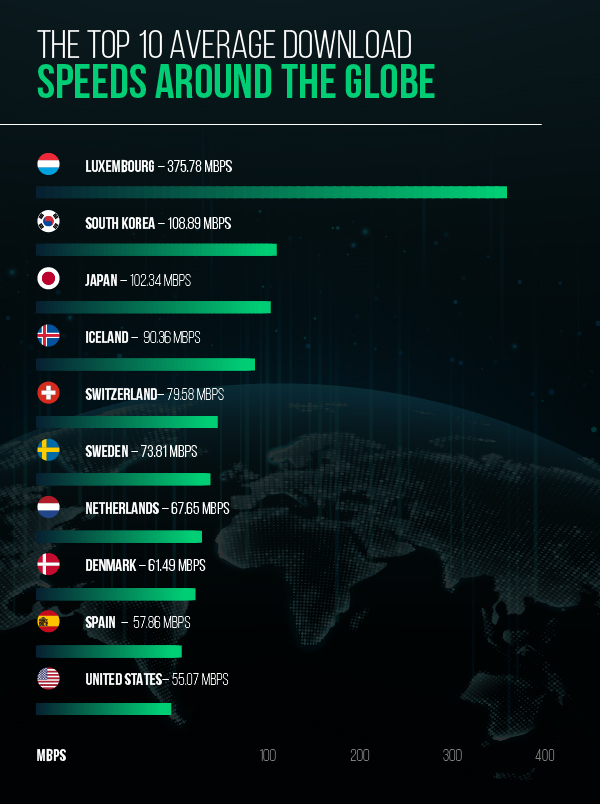
Improving Internet Speeds: A Plan for the Future
Internet coverage and speeds depend on what an ISP is willing to invest in an area. Building complex infrastructure doesn’t always make financial sense, especially in rural areas. Companies don’t want to spend lots of money only to reach a few customers.
Three strategies help incentivize broadband development in rural areas:
- Regulatory incentives allow companies to build infrastructure in rural areas cheaply
- Government grants help cover build costs
- Publicly-funded municipal broadband act as an alternative to commercial ISPs
Another potential option is the creation of a low-orbit satellite mesh. It’s similar to satellite services but significantly less expensive. Low-orbit broadband could reach rural areas without requiring the building of any infrastructure. Although Space-X announced plans for space-based broadband access by 2020, industry experts predict it’ll take much longer to rollout.
Final Thoughts
The quality of the Internet in your state affects far more than your ability to stream shows and play online games. Instead, speeds and coverage impact the economy, employment, education and health of every resident.
Unfortunately, the digital divide grows wider each year. Speeds will almost certainly continue to rise in large cities and suburbs. However, rural regions will likely remain in a digital desert.
The first step towards improving Internet access for all is identifying what areas need help. Although current Internet coverage levels appear grim in many places, improvement is possible. Bringing high-speed Internet to everyone will boost the economy and well-being of the entire country."
_____
✓ "...Now, it appears that the person who penetrated Rockstar’s corporate network is open to the idea of blackmailing the company, with some evidence that he or she is taking bids to not leak more content. And that sucks. But attempting to bury this leak once it’s already out in the wild makes as much sense as attempting to un-grill a bone-in ribeye.
It ain’t going to work and, meanwhile, your cooked steak is getting cold."
Filed Under: copyright, dmca, gta, gta 6, streisand effect, takedown
Companies: rockstar games
Rockstar Tries To Bury ‘GTA6’ Leak With DMCAs, Streisands Them Instead
from the paging-ms.-streisand dept
At this point, we probably have enough stories about companies trying to bury leaked information or content that hasn’t been publicly released via DMCA takedowns that it warrants its own metatag. It’s both amazing and frustrating that this is still a tactic companies, particularly tech companies, think somehow works. It doesn’t. Once a leak is out on the internet, the game is already over. That footage is out there, and trying to do battle with internet to disappear it just isn’t going to work.
Which brings us to Rockstar Games. Days ago, Rockstar acknowledged that its internal corporate network had suffered an intrusion. As a result, a bunch of data and files were exfiltrated, including footage of the Grand Theft Auto 6 game that is in active development and the source code for past GTA games.
All of that is entirely understandable. And, for the purposes of this Techdirt post, entirely besides the point. Because like many of Rockstars peers that have gone through this in the past, instead of trying to acknowledge the leaked footage in a PR mode that would be built around messaging to any members of the public that might view the leak and reach the wrong conclusions, Rockstar instead decided to just try to play DMCA whac-a-mole with the entire internet.
. . .
✓ "...
The law needs to go. It’s incapable of addressing the current computer climate and its ability to criminalize any “unauthorized access” continues to harm cyber security work — something that actually does more to protect computer/internet users than a badly written law that is most often wielded with the worst of intentions. This is the sort of useful thing the law criminalizes:
Legitimate internet researchers in the UK are also prevented from accessing hacked files that are shared on the dark web to warn victims their data has been stolen.
And this threat to researchers is not theoretical.
In 2012, a York University student was sentenced to eight months in prison for accessing Facebook’s internal systems.
Glenn Mangham, who was 26 at the time and had previously warned companies about the bugs he had discovered, later had his sentence halved on appeal.
Unfortunately, legislators move much more swiftly to enact laws than to roll them back. But a 1990 law erected to prevent malicious hacking of voicemail is long due for an overhaul, if not a complete removal."
Filed Under: anti-hacking law, cfaa, computer misuse act, security research, uk
Security Experts Ask UK Government To Roll Back Old Computer Abuse Law That Harms Security Research
from the thirty-years-is-several-lifetimes-ago-in-computer-years dept
The US government passed the Computer Fraud and Abuse Act in 1986, years before computers became something everyone had at home and carried around in their pockets every day. The CFAA had a purpose, but its value declined as computing advanced. The abuse it was written to address tended to take a backseat to abuses of the law by prosecutors and private companies to punish people for discovering security flaws or using technology in ways some people never expected.
The law has done more harm than good, criminalizing security research and providing a handy weapon for private companies to deploy against those who point out their security holes.
The same thing has been happening in the UK, thanks to a law that is
only four years younger than the justifiably despised CFAA. As Matthew Field and Gareth Corfield report for The Telegraph, security experts are asking the incoming prime minister to put this ancient computer abuse law out of everyone’s misery.
✓ "...
As that summary notes, it’s not just that material was blocked without justification. Compounding the problem are appeal processes that are biased against creators, and a system that is rigged in favor of Big Content to the point where companies can falsely claim copyright on the work of others. The Fundación Karisma report is particularly valuable because it describes what has been happening in Colombia, rounding out other work that typically looks at the situation in the US and EU.
Follow me @glynmoody on Twitter, Diaspora, or Mastodon. Post originally from Walled Culture.
Filed Under: copyright, copyright filters, creators, eu copyright directive, fundacion karisma, upload filters
Study Shows That Copyright Filters Harm Creators Rather Than Help Them
from the filters-are-just-bad dept
The EU Copyright Directive contains one of the worst ideas in modern copyright: what amounts to a requirement to filter uploads on major sites. Despite repeated explanations of why this would cause huge harm to both creators and members of the public, EU politicians were taken in by the soothing words of the legislation’s proponents, who even went so far as to deny that upload filters would be required at all.
The malign effects of the EU Copyright Directive have not yet been felt, as national legislatures struggle to implement a law with deep internal contradictions. However, upload filters are already used on an ad hoc basis, for example YouTube’s Content ID. There is thus already mounting evidence of the problems with the approach. A new report, from the Colombian Fundación Karisma, adds to the concerns by providing additional examples of how creators have already suffered from upload filters:
✓ "...Whatever the eventual fallout from this show of force, Sheriff Villanueva is sure to survive it. He’s elected, which means he can’t be run out of office until voters decide they’ve had enough. And until they decide that, this is the sort of dubious law enforcement work they’ll be paying handsomely for."
Filed Under: 4th amendment, alex villanueva, civilian oversight board, free speech, lasd, patti giggans, sheila kuehl
Companies: peace over violence
LA County Sheriff Still Targeting Critics, Searches Home Of Civilian Oversight Board
from the gang-that-favors-beige-polyester-blends dept
Current Los Angeles County sheriff Alex Villanueva campaigned with the promise he would clean up the literally gang-infested Los Angeles Sheriff’s Department (LASD). Once he took office, however, he just became part of the problem. Rogue units of deputies continued to freely operate, resulting in federal lawsuits, a bunch of whistleblowing, and [re-reads report] the attempted removal of an LASD gang tattoo with a [re-re-reads report] handgun.
The Sheriff has responded to criticism of his non-efforts to purge the department of bad officers by opening investigations into his critics and threatening city council members with defamation lawsuits for (truthfully) referring to the existence of deputy gangs in his department.
The intimidation continues. . .
✓ "...Nothing is perfect, obviously, and everyone can point to this or that horror story, but on the whole this system has worked well in the outside world, and it can and should work well on the internet. We don’t need to turn the internet into Disneyland. We can and should teach our kids how to appropriately use the internet, including how to deal with it when they come across questionable situations. That’s actually training kids how to become proper adults and how to deal with things, rather than raising them in Disneyland and expecting that it teaches them enough to handle the outside world on their own."
Filed Under: disneyland, for the children, internet, kids, kosa
The Internet Is Not Disneyland; People Should Stop Demanding It Become Disneyland
from the bad-ideas dept
Disneyland can be a fun experience for kids (and potentially a frustrating one for parents), but it’s a very controlled environment in which everything is set up to bend over backwards to be welcoming to children. And that’s great for what it is, but the world would kinda suck if everything was Disneyland. I mean, some countries have tried that, and it’s… not great, especially if you believe in basic freedoms.
Here’s the thing: Disneyland’s limits are great for a place to visit occasionally. As a vacation. But it’s not the real world. And we shouldn’t be seeking to remake the real world into Disneyland. And I think it’s especially true that most parents wouldn’t want to raise their kids in Disneyland and then send them out into the real world upon turning 18, and assuming they’ll be fully equipped to deal with the real world.
Yet that’s exactly what some busybody politicians (with support of the media) have been trying to do. They want to pass new laws that effectively demand that the internet act like Disneyland. Everything must be safe for kids. That means much greater surveillance and much less freedom… but “safe for kids.”
Except it’s not. Disneyland is fantasyland. It’s not real life. And we don’t train kids how to be thoughtful participants in society if we raise them in Disneyland. . .
✓ "...This is where the US government should intervene. It may make things uncomfortable, but if it doesn’t stand up for one of its own, it will only encourage the Saudi government to continue targeting foreign citizens with criminal charges over speech that would not be illegal in their native lands."
Filed Under: carly morris, free speech, human rights, saudi arabia
Saudi Prosecutors Are Targeting A US Citizen For Tweets Criticizing The Government
from the broad-power,-thin-skin dept
The Saudi government is decidedly unconcerned that other nations may have concerns about its censorship efforts. I mean, if need be, it will murder and dismember critics who prove unwilling to be silenced by less drastic efforts.
Having some of the keys to the oil kingdom helps, providing leverage against foreign governments that may want to issue sanctions or publicly criticize the wealthy and powerful nation. Its power over its own citizens is undeniable. Quasi-legislative responses to issues like misinformation and cybersecurity have given the Saudi government even more weaponry to deploy against citizens who refuse to bend a knee.
And the government will go extraterritorial if needed. Thanks to careless purveyors of powerful malware (yeah, that’s you, NSO Group), the Saudi government is able to target foreign citizens with exploits that fully compromise their communication devices.
This case, brought to our attention by Sarah McLaughlin, contains a couple of wrinkles that may make it more difficult to convince the Saudi government to end its investigation of a US citizen over critical tweets.
Here’s what’s happening now, as detailed by Human Rights Watch’s call for an end of this US citizen-targeting oppression effort:
✓ "...Granted for every California and Maine that occasionally attempts to
protect broadband consumers from privacy and net neutrality violations,
there are three or four states where lawmakers couldn’t care less. In
most states, telecom giants literally control every last policy
initiative that enters and exits state legislatures, and it’s usually
pretty clearly reflected in state broadband statistics."
Filed Under: broadband, california, consumer protection, high speed internet, maine, net neutrality, privacy, telecom
Big Telecom Drops Its Legal Assault On Maine Over Broadband Privacy Rules
from the you-can't-win-'em-all dept
When it comes to manhandling US regulators and gutting telecom industry oversight, the nation’s biggest telecom monopolies have had an impressive five year run.
Under Trump, they managed to lobotomize FCC consumer protection authority, dismantle federal net neutrality rules, dismantle media consolidation rules and get all of their planned megamergers approved, kill off broadband privacy protections, and get paid while doing it in the form of a giant tax cut in exchange for doing absolutely nothing.
Under Biden, they’ve managed to derail the nomination of a popular and qualified FCC Commissioner in Gigi Sohn, ensuring that the agency remains in partisan gridlock for at least two years. They’ve also very much enjoyed (and routinely encouraged) the myopic US policy focus on “Big Tech.”
One space they haven’t had as much luck is in bullying the handful of states that actually want to engage in consumer protection in the wake of federal dysfunction and apathy.
Like in Maine, where ISPs have been forced to drop their lawsuit against the state after it passed one of the toughest privacy laws in the country in 2019 (requiring that consumers opt in to data collection and monetization). Courts continually shot down the telecom industry’s arguments, forcing the industry to give up the fight:
___
.jpg)
.jpg)







No comments:
Post a Comment